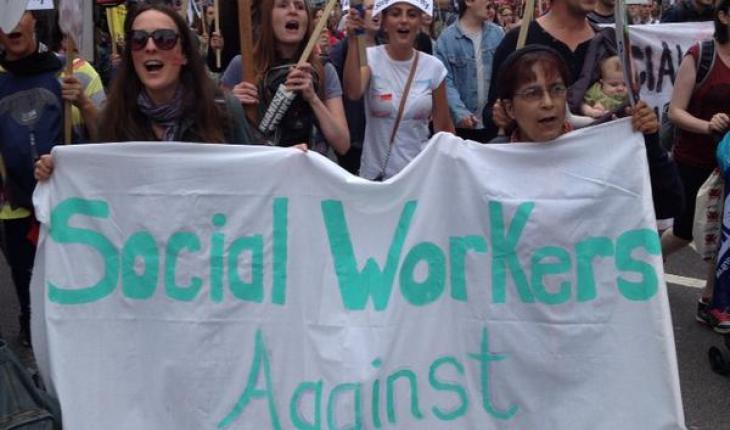By Charlotte Webster–
Adults’ social workers and occupational therapists have gone back on strike over inequalities in pay with children’s colleagues at their council.
The UNISON members at South Gloucestershire Council are walking out today (30 May) and on Thursday (1 June) in protest against the £3,000 recruitment and retention payments that children’s social workers at the authority receive, but they do not.
The union has been in dispute with the south west authority over the issue since last summer, leading to a three-day strike in April, however, UNISON said that it remained unresolved.
UNISON has been in dispute with the local authority since last summer. The new dates follow three days of strike action in April.
According to the union, a quarter of local authorities are now offering these “market forces” supplements as many are facing significant problems attracting and keeping staff. But UNISON says more staff should receive the supplement.
The dispute relates to payments for social workers, advanced and senior social workers in children’s services at South Gloucesteshire, involving:
Neither of these are available to adults’ social workers or OTs.
Senior social worker and UNISON member Nick Fryer said it was inequitable for practitioners who happened to work in children’s services to receive a benefit not accorded to equally qualified colleagues in adults’ services.
“We will continue to make that point to the decision makers,” he added.
“Strike action is always a last resort, but staff are determined to take a stand on this important issue,” said UNISON South West regional organiser Jayne Jackson.
“Negotiations to date have sadly not led to a resolution. But only through talking will this issue be settled. The council must double its efforts to end the strike by paying up and showing it values all its social work employees.”
At the time of the April strike, a South Gloucestershire spokesperson said: “We are dedicated to responding to the issues staff tell us are important to them and we want to create environments where our workforce can thrive. We received positive results to our recent adult social care staff survey and the outcomes of the external health check for social workers with adults has shown that we are continuing to make progress.
“The council remains committed to engaging with UNISON to meet our shared ambition of investing in career development and preparing our staff for the future challenges social care faces.”
Crucial Role
One social worker who insisted on anonymity, told The Eye Of Media.Com: ”Social workers play a crucial role in supporting vulnerable individuals and communities, addressing social inequalities, and promoting well-being. However, inadequate pay and work conditions have been long-standing concerns for social workers in the UK.
”One of the primary motivations behind social workers striking over pay is the significant salary disparity compared to other professions requiring similar levels of skill, responsibility, and education. Low pay can lead to demoralization, frustration, and a sense of undervaluation among social workers. Strikes highlight these grievances and call attention to the need for fair and competitive remuneration.
”Inadequate pay can also contribute to difficulties in both retaining experienced social workers and attracting new talent to the profession. This poses a threat to the stability and continuity of social work services. Strikes can draw attention to these challenges and emphasize the importance of addressing pay issues to ensure a skilled and motivated workforce in the long term.
Workload and Stress
Social work is known for its demanding nature, involving complex cases, emotional strain, and high caseloads. Insufficient pay exacerbates these challenges by adding financial pressures and potentially necessitating additional employment or longer hours. Strikes serve as a means for social workers to advocate for reasonable workloads and improved work-life balance, ultimately enhancing the quality of care they can provide to clients.
Concerns have been expressed that social work strikes can lead to disruptions in services, impacting vulnerable individuals and communities who rely on support and assistance. This disruption can result in delayed or reduced access to vital interventions, assessments, counselling, and other forms of support. It is crucial to ensure that any strike action takes into account the potential effects on clients and that alternative measures are put in place to minimize harm.
Clients who depend on social workers may experience increased vulnerability during strike periods. They might face difficulties in obtaining essential resources, accessing emergency support, or navigating the complexities of their situations. The interruption of social work services can have detrimental effects on those already facing challenging circumstances, exacerbating social inequalities and compromising their well-being.
Advocacy and Policy Influence
Social work strikes can also serve as a platform to highlight systemic issues and advocate for policy changes that benefit clients. By drawing attention to the challenges faced by social workers, strikes can shed light on the broader shortcomings in social work systems and prompt discussions about the need for better funding, resources, and support for social work services. Ultimately, this advocacy can contribute to long-term improvements in the quality and accessibility of social care.




